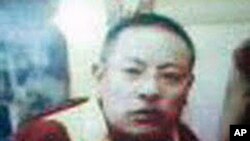Sopa Tulku, also known as Sonam Wangyal, self-immolated on the morning of January 8 in Golok Darlak, Amdo, calling for “Freedom in Tibet’ and ‘Long Live His Holiness the Dalai Lama.” Lama Sopa Tulku is the head lama of Tongkyap monastery, the highest religious figure to have taken out such a protest act to date.This follows two other self-immolations that took place on January 6 in Ngaba, Sichuan.
Reports say that Lama Sopa Tulku, 42, poured kerosene on his body and set himself alight, and that he died on the spot. Chinese security is said to have forcibly taken the remains of his body from the gathered crowd of Tibetans, causing the tensions to escalate in the township as 2000 people gathered to take back Sopa Tulku’s remains to conduct proper Buddhist rites. Prior to his protest act, Lama Sopa Tulku had posted flyers in Darlak County that explained his act as being for ‘our nation’s freedom and religious freedom’ and that it was not for ‘personal reasons’.
14 Tibetans have self-immolated in the past year calling for ‘freedom’ and the return of the Dalai Lama to Tibet, triggering harsh crackdowns from the Chinese authorities that have included the detention and disappearance of countless individuals. Beijing has denounced the self-immolations and accused Tibetan exiles of encouraging them.
The Central Tibetan administration, the exile Tibetan governance body based in Dharamsala, India, has stated that these and other protests in Tibet are a direct result of China’s repressive policies, and that the harsh crackdown on Tibetans leave no other avenue for them to express their grievances.
The United States said Monday it was "seriously concerned" over self-immolations by Tibetan monks, adding they represent deep frustration over curbs on religious freedom in China.
"We're seriously concerned by reports that three more Tibetans have self-immolated over the past few days," State Department spokeswoman Victoria Nuland said, adding Washington has consistently raised the issue with Beijing.
